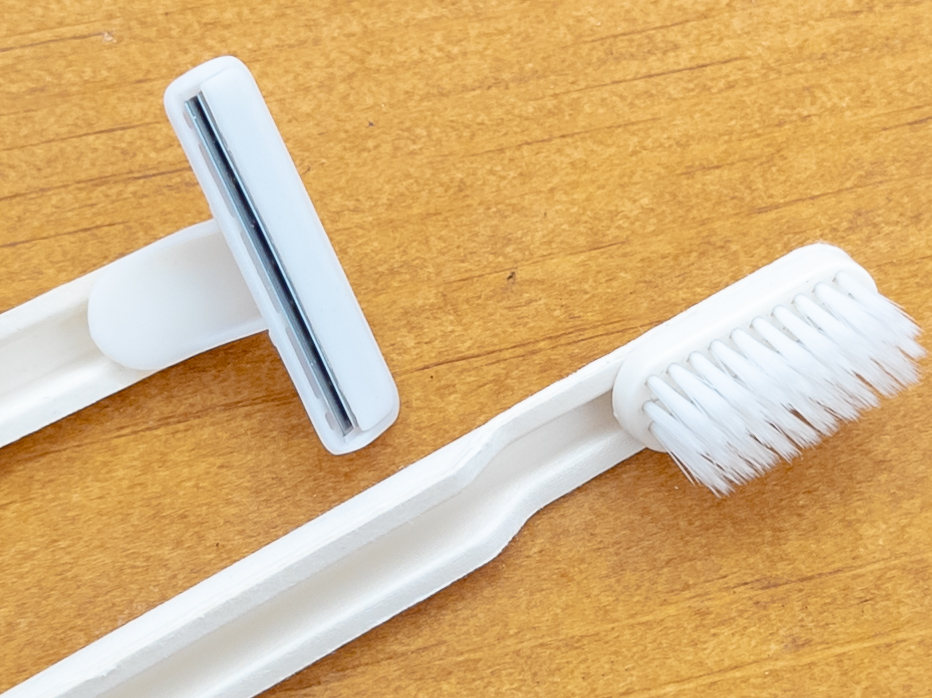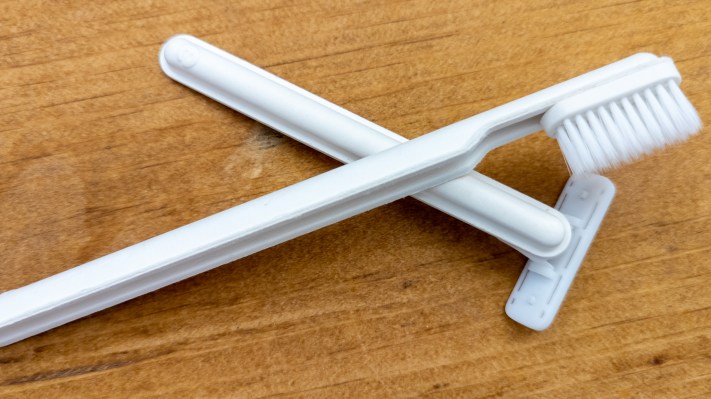Travel, conferences, hotels, they all have something in common: Everything is designed to be used once, and then discarded. Of course, it would be delightful if everyone was able to not use single-use plastics for their cups, razors, toothbrushes and everything else, but unless consumers rebel, that’s unlikely to change anytime soon. It ain’t just single-use issues either: According to the Journey of a Toothbrush short documentary, most people go through 300 toothbrushes in their lifetime. That’s a big pile of plastic.
“We have started this company effort together with my husband. It was his idea — he’s an industrial designer and he was working a lot with different materials, prototyping and working with different gadgets. He actually told me about this idea on our first date: the nonsense of using a disposable toothbrush in your hotel for three minutes and then throwing it away and nothing will happen with it afterward,” explains Dasha Kichuk, CEO at Effa.
There are a number of companies trying to make these high-volume disposable products have a little bit less of an impact. Life without Plastic makes toothbrushes out of wood, Brush with Bamboo makes ’em out of, well, you guessed it. Eco Roots makes toothbrushes and dental floss out of bamboo. It’s a thing, lots of people are doing it. At CES, a Ukrainian company announced it is joining the fray in the retail market. Effa, which makes toothbrushes out of paper, just announced a disposable razor made mostly of paper, and is preparing to offer a number of other products as well.
Effa’s toothbrush is made out of sugarcane-based paper. The brush head is made of PBT Nylon — the same as many of the Bamboo brushes use, which can be made from recycled plastic bottles. The company also innovates in its approach to recycling — after use, you can separate the head from the body and throw them into different bins for proper recycling. In addition to the toothbrushes, the company makes a razor made of the same materials as the toothbrushes, with removable heads for separate recycling.
“We are creating a white label brand, because a lot of companies we’re working with, want to have our logo — and theirs — on the products. They want us to be part of a sustainable journey and they want to show their support of sustainable startup,” explains Kichuk. “We started shipping just a month ago. So far, we have shipped our first batch to retail shops all over Ukraine — that batch is around 20,000 pieces — and we have made 2.6 million sales for toothbrushes to be delivered within 2022. Right now we have orders in Korea, in Europe, in Ukraine, but we are here at CES to look for new customers who are eager to go to the U.S. market. Our mission is not to be the manufacturing company: We want to create a brand. America is the best country to do that; this is where brands are born.”
The founders, Dasha and Ilya Kichuk, told me that the company was originally focusing on the travel space, and claims it had made sales to a number of high-profile clients, including Marriott, Radisson, Lotte Hotels and others. The pandemic put a significant dent in travel, and the company decided to pivot to the retail market in its native Ukraine, with an imminent launch in local grocery chains. At CES, the company is trying to find broader distribution for its products.

I tried out Effa’s paper toiletries; they look and feel like regular paper, but the way the products are designed means they still feel sturdy and good to use. After use, recycling the paper handle and the head separately is easy. Image Credits: Effa.
“I love this question!” beams Kichuk as I ask her why the company is named Effa. “It is named after a butterfly that lives and dies in just one day, Ephemera. The ultimate goal for our company is to replace those plastic disposables. We are eager to replace plastic disposables in the medical industry. Another market that is interesting is prisons because apparently plastic toothbrushes are forbidden in prisons. That’s what we want to explore — along with working with social organizations like UNICEF and the Red Cross, to bring our social mission there as well. We are ready to ship up to 4 million pieces in the next year, and we need to start growing our team to start growing from there.”
The company currently consists of six people, including the husband-and-wife CEO and CMO team, a marketing person, a salesperson and an R&D department.
“I say R&D department,” laughs Anna Sulim, the company’s marketing and PR manager, “but it is one person. So we are a small team, but we work around the clock to fulfill this mission.”

